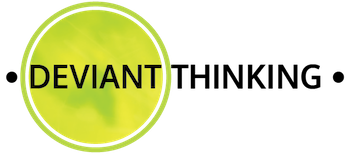CLICK HERE TO DOWNLOAD THE TRANSCRIPT (PDF VERSION) Jennifer Thompson 00:00 Welcome back to The…
CLICK HERE TO DOWNLOAD THE TRANSCRIPT (PDF VERSION)
00:00 Welcome back to The Deviant Thinking podcast. I’m your host, Jennifer Thompson, and today and always will explore career advice that breaks the rules. Today for some deviant thinking, which I’m always up for, and really exploring, what can you do to grow your skill set to become an awesome employee, employer or just awesome in your career overall. So it doesn’t matter if you are a solopreneur or an entrepreneur, or part of the corporate cycle of things, growing your skill sets and leadership, help you be more successful.
00:46 And what skill set in particular are we going to talk about today? Well, if I have your curiosity piqued, that’s awesome. Because today it’s all about curiosity. Curiosity has been become the buzz word among leaders. It is a skill that is sought after, and seen as a highly valuable skill out in the marketplace. When I started Deviant Thinking years ago, one of the things I reached out and did was to interview hiring managers, CEOs, executives, about the hiring process and about the leadership skills that people needed to be great within their organization. I won’t lie I was shocked at the number of times curiosity came up as the number one skill that they are looking for in new team members and a new partners. People want to be around others who are curious. So today, we’re going to take some time and explore what is curiosity. mean, how do we enhance our own curiosity? And why is curiosity important?
02:08 Also, we’ll talk a little bit about the interviewing process and how you can show up as a truly curious individual. So curiosity being seen as this career superpower. It’s an interesting word because I think it’s a word many of us have associated with a negative side. We all know the story of curiosity killed the cat. Our education system works very hard to squash our curiosity, especially in our earlier days. So why is it emerging as this important topic now, for corporations for organizations going forward? Well, let’s actually start with the origin of that phrase, curiosity killed the cat When I was researching this, I found it really interesting that the first reference to curiosity, and a cat actually came out of the Shakespearean time. But it had a twist on it. It wasn’t curiosity that killed the cat. It was care that killed the cat. And care continued to be the word used in this phrase up until the 1900s. I find this just absolutely amazing because I think of it and say, Wow, care killed the cat. So what was that? Well, it was worried. It was worry and too much fussing over things that they say killed the cat. So really, very opposite of our current state saying of curiosity killed the cat. The term curiosity killed the cat came about for the first time in writing that I can find in about 1916 in a Washington Post article, and it was titled curiosity killed the cat. And what had happened was that someone’s cat had gotten out and fallen down a chimney. And literally, unfortunately, didn’t make it.
04:19 But it was interesting because soon after that, that phrase started showing up over and over again, that curiosity killed the cat. Well, what’s interesting too, is if we think about that time period, the early 1900s that was the industrialization of the United States and the world where we were teaching people how to be good manufacturing people were we wanted people to show up on assembly lines and do the work that they were told to do. We didn’t want people who were curious, we didn’t want people who change the process. Who thought of things differently? We wanted people who followed the orders. So it’s not unusual to me to think that curiosity killed the cat became that saying.
05:13 What I find interesting in today’s world is we’re now out of that Industrial Age, and we’re moving to an Information Age. So Curiosity has become an important value yet again. And it is that curiosity that really helps people be successful. So today, again, it’s all about exploring curiosity. Going back to those early interviews I did really asking about those traits of leadership that my clients were looking for, and finding curiosity as the number one trait really blew my mind. I knew how important curiosity was, but I was aware of how important it was to others. My favorite story that I kind of uncovered as I went through this process was from a gentleman who told me about the number one place where people failed the interview and his company. And the number one place was the company tour. Yep, the company tour. I couldn’t believe that one could fail an interview on the company tour part. So what was happening that people were failing the company tour? It’s an interesting point, because to me, that’s the spot where we all relax. You know, you’ve gone through the formal interview process, and you’ve done well there. So now’s the time to see hey, do you like the organization? And it’s the time where often we kind of let our guard down and we say, oh, let’s Yeah, let’s go on a tour. Let’s see, see what’s here? Well, for this organization, which was a, which is not was a highly innovative company, they saw the company tour as a great opportunity to see if their candidate was truly curious about what they were doing. This organization was breaking the rules, they were doing all kinds of new things. And the last thing they needed was for someone to come in and criticize this newness. And for someone to think they knew it all. Because they were breaking boundaries. They were again, just doing some really, really great new things. So while on the company tour, they were looking for a potential new hire, to be wildly curious, to want to be interested in what was going on in the company, to see things that were new, and not just tell them what they could do to to help this company out. They wanted them to be wildly curious. And interestingly enough, from this gentleman, he said probably over 50% of the applicants that came through, were not curious. They wanted to tell them how things should be, how they’ve done them in other organizations what they were doing wrong, instead of just simply being curious.
08:26 So it made me really understand the value of curiosity. And that brings about so much more openness. So why is it that this curiosity is really important to these organizations? Well, there’s a few things. One is that curious people take it upon themselves to learn more curious people want more information they want more questions in their most often not gonna stop at the first note Answer. And again, with our times growing and us becoming, moving into this information age, we don’t always know the answer to the questions that we have. So we need to be wildly curious and wildly learning. Again, another skill that I often hear is that people want people who are continuous learners, and continuous learners are infinitely curious. So that’s one big reason why curiosity is really, really important. The other thing is that curious people are often more open minded, and they are more able to react to change in a favorable way. Because they’re curious. They don’t see things as only having one answer. So they as a result, they see things with a wider viewpoint, and they can adjust to change and they can CY change would be really, really important. Kind of going along with that. It also helps that they are open to those new ideas and that they don’t hastily make decisions, just because they’ve done something the same way in the past. So again, opening of that mind opening of a skill set that allows you to see things in a different way adapt to change, and make better decisions because you’re more open minded, so that the ability to see different perspectives and be curious, really, really important. The other thing that’s really interesting is that curious people score higher in the EQ side of things. So the emotion quote, which is, I think, wildly interesting. So, in being a bit curious about this myself, I thought, well, why is that why do people score Hire? Well, it’s because not only are they curious about different processes and different solutions, they’re also more apt to be more curious about different people. And when you can show up as curious about others that seen as more respectful and more inclusive. So again, another great reason to show your curiosity. And then I cannot emphasize enough that all of this means that you’re a lifelong learner. I know that people who show up as curious, appear younger, they appear more hip, they know more things from different areas and can combine things in in a greater way. So curiosity really feels all of these different areas. So I think now you can see what Why curiosity is so important. It’s really a base that allows you to reach out into many, many different areas. Because coming in with curiosity, keeps that open mindedness keeps that ability to see multiple answers, and allows other people to feel the respect that you have for those ideas. So again, building great teams. So if you’re sitting here listening to this, I’m going to believe that you’re a little bit curious yourself. I tend to have listeners who are curious, they like deviant thinking they like to think outside the box. And that’s why you’re listening to begin with. But I also know that curiosity is a skill set that can grow and it’s actually an easy skill set to expand. So you don’t have to be born naturally curious, although I believe strongly that most of us Are if we watch children explore their wonderfully curious. It is often later in our life that we’re told things like curiosity killed the cat. Why do you ask so many questions? Can’t you just listen? Those are the things that shut down our curiosity.
13:19 But it means that it’s part of all of us. So it’s easy to expand that skill set. And there’s some really, really easy ways to do that. The first thing to note is that being curious, helps us again, to expand our ability to hear and understand. And there’s a reason for that it’s actually a biological reason. New ideas are threatening to us as human beings. It is a natural thing that happens in our physiology, when someone introduces something new that we don’t recognize it often. triggers a fight or flight response. Well, a fight or flight response event physiologically actually shuts down a lot of the parts of our brain and makes us focus on the things that we understand and makes us try to make sense of this. And if we don’t make sense of it, we definitely see it as a threat. So when we’re in this threat mode, we aren’t seeing all of the possibilities. So being curious is a natural cure for that adrenaline rush, that adrenaline rush that gets us into fighter flight.
14:38 So how does that work? Well, the first thing is very, very simple. If someone presents an idea to you and you feel like you’re getting that fight or flight response, you feel like you’re shutting down. The easiest thing you can do is ask a question. Yep. It’s that simple. And if you’re not even sure what question to ask, you can make it even more basic than that. Wow, that’s a really new idea. I’m curious about that. What’s made it interesting for you. So you can just say the words, I’m curious, tell me more. And it starts to calm down that fight or flight response, which allows you to be more open. So I highly encourage you that the next time someone runs up to you excited about a new idea, and you want to jump into and tell them why all the reasons that idea is wrong, and it won’t work. Stop a minute and say, Wow, that’s really interesting. Tell me more. I’m curious and see what happens. So that’s one way to build our curiosity muscle is literally stating I’m curious. The next level of that though, is asking great questions. And I am a big believer in great questions. But, again, the wrong question can trigger that fight or flight and get us back into the narrowing of our ideas. So I want to take a moment and ask a question of all of you and I want you to feel your body response. When I asked this question. The question is, why do you listen to this podcast? Why do you take the time out of your day to listen to this podcast? Why is it important? now feel that in your body. I believe many of you felt that trigger of fight or flight because I asked you to justify why this is important to you. Why is a question that does trigger fighter flight asked Little kid, why they want a cookie for dinner. And they’re going to give you all kinds of justifications, and all kinds of excuses. But there is a remedy to this. And there is a way to not trigger fight or flight. And it’s very simple. It’s just changing a few words in the questions that you ask. So if I ask a very similar question to what I’ve just asked, and I reach out and I say, what about listening to this podcast is important? What value Have you gotten from listening to this podcast? How do you see yourself using this information in the future? Now what’s your body saying? It should be a bit more relaxed, your mind should be a lot more open. And you should have an expanse of thoughts as opposed to a narrowing of thoughts.
18:01 So going back to that thought of being curious and building that curious muscle, it is really easy to be seen as more curious, by changing your vocabulary, just a touch and getting rid of y from your vocabulary. Because that wide definitely triggers that fight or flight response. And changing it up and adding what and how into your vocabulary can make a world of difference. So just envision yourself on an interview, or maybe it’s even not an A true interview, but you’re working on a project with your boss. And you’re really curious about why something is happening this way. What if you change that word, instead of asking your boss will why are we doing things this way? You can look at him and say, Well, what About this is important. How do you see this working? What pitfalls Do you think I need to avoid? What about this would really help our organization? When you ask questions like that you are going to be seen as a leader, you’re going to be seen as having that higher EQ score, you’re going to be seen as much more open and accepting of other people’s ideas. So it’s definitely a huge takeaway from this episode that you can go on and practice this at your next meeting. And again, I also think if if you are truly in that interviewing state, and you’re truly curious about an organization, asking them questions using those what and how words are going to make you look brilliant and really help push your career ahead. Your action assignment for this week’s podcast is to go out and build your curiosity. muscles. Definitely start to incorporate phrases like, Oh, I’m really curious about that. Tell me more. What about that as important? How do you see that integrating with what we already do? Start adding those phrases to your vocabulary and your normal patterns of interaction. And I promise you, your career will start to lift, you will be seen as a wonderfully curious individual that is respectful of all ideas. And this is not just Jennifer saying that curiosity is important. Curiosity is a subject that is being explored by some of our greats that you know, it’s out there. Harvard Business Review has a great article on curiosity. There’s all kinds books right now on curiosity. It is definitely the currency of future careers. So it is worth taking that time to build that curiosity muscle.
21:15 Well, that wraps up things for today. And I have to say, I am wildly curious to know if you’ve liked this episode. So what about this episode was interesting. Take a minute and drop me a line and tell me what it was that you liked. Also, I would love to know how I can help more in the future and what topics would be fabulous additions to this podcast. So definitely take a minute I’ve put our email address in the show notes and give us some great suggestions of what you would like to hear on this an upcoming podcasts. I wish you all lots of curiosity and Your life this week, and have a great day. If you’ve loved this podcast, take a minute to head on over to iTunes and give us a review. Those shout outs mean the world to us and they allow other people to know the value that we’re able to put out there. So thanks again and have a great week. Until next time, be deviant.




